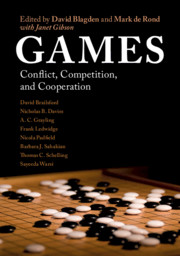Book contents
- Games
- The Darwin College Lectures
- Games
- Copyright page
- Dedication
- Contents
- Figures
- Notes on Contributors
- Acknowledgements
- Introduction Games: The Spectrum of Conflict, Competition, and Cooperation
- 1 Personal Principles in the Political Game
- 2 The Game of Crime and Punishment
- 3 Wittgenstein's Games
- 4 Games in Sports
- 5 Losing the ‘New Great Game’
- 6 Games for the Brain
- 7 Games Animals Play
- Afterword The Game Theory of Conflict
- Index
1 - Personal Principles in the Political Game
Published online by Cambridge University Press: 26 October 2018
- Games
- The Darwin College Lectures
- Games
- Copyright page
- Dedication
- Contents
- Figures
- Notes on Contributors
- Acknowledgements
- Introduction Games: The Spectrum of Conflict, Competition, and Cooperation
- 1 Personal Principles in the Political Game
- 2 The Game of Crime and Punishment
- 3 Wittgenstein's Games
- 4 Games in Sports
- 5 Losing the ‘New Great Game’
- 6 Games for the Brain
- 7 Games Animals Play
- Afterword The Game Theory of Conflict
- Index
Summary
Politics was described by Aristotle as ‘of, for, or relating to citizens’. In more modern terms, the definition of politics is ‘the activities associated with the governance of a country or other area, especially the debate or conflict among individuals or parties having or hoping to achieve power’. But is the practice of politics really about providing for the citizen, as envisaged in the Greek meaning, or has the game of politics become an end in itself? And, in the game of politics, is winning the ultimate aim, even if this requires sacrifice of principles?
- Type
- Chapter
- Information
- GamesConflict, Competition, and Cooperation, pp. 8 - 24Publisher: Cambridge University PressPrint publication year: 2018

